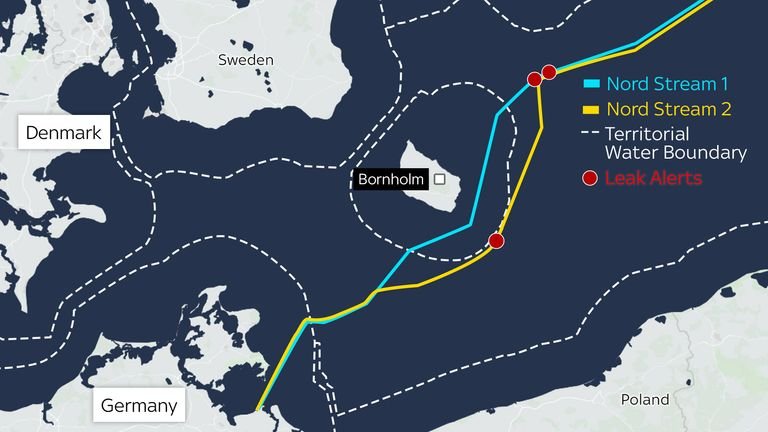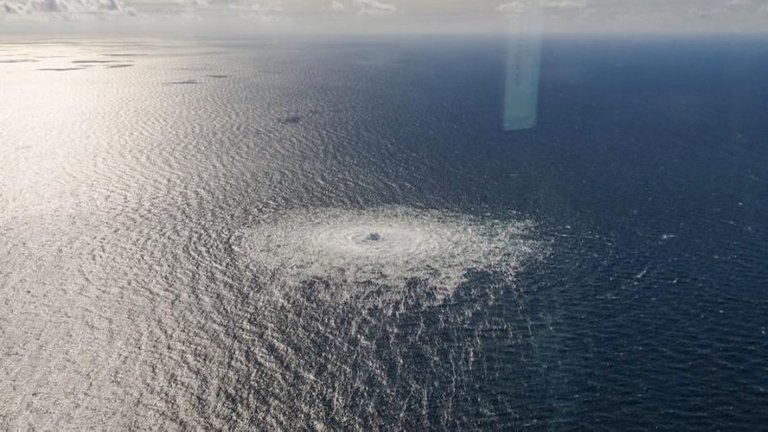After the Nord Stream 1 and Nord Stream 2 pipelines, which connect Russia and Germany, suffered unprecedented damage, as a result of the destruction they sustained in one day simultaneously, followers wondered who would bear the cost of the repair.
What happened?
On September 26, successive accidents occurred near two pipelines exporting Russian gas to Europe, resulting in two gas leaks, one in "North Stream-1" and another in "North Stream-2" near the Danish island of Bornholm.
On the same day, the Bornholm seismograph recorded an earthquake at two o'clock in the morning and another tremor at seven in the evening. Seismologists in Sweden also recorded powerful undersea explosions before the gas leak.
Over the past days, the West and Russia exchanged accusations about being behind the sabotage work of the gas pipelines between Russia and Europe.
Kyiv accused Moscow of carrying out a sabotage operation aimed at stopping gas supplies to Europe, describing the incident as a planned "terrorist attack".
While the Kremlin accused unnamed foreign countries, its spokesman, Dmitry Peskov, said that he "suspected the involvement of a foreign country in the gas leakage from 4 sites in the Nord Stream 1 and Nord Stream 2 pipelines."
The Executive Director of the International Energy Agency, Fatih Birol, said that "it has not yet been determined who is responsible for the sabotage, but it is very clear who is behind the incident."
Nord Stream AG said Monday it was investigating the causes of the pressure drop in the pipeline. German authorities also reported a pressure drop in Nord Stream 2, the pipeline between Russia and Germany that had been dormant after the German government prevented its opening in the wake of the Ukraine War.
Kremlin spokesman Dmitry Peskov said on Tuesday they were "extremely concerned" about the news. When asked if it could have been an act of sabotage, Peskov said: "At the moment, no possibility can be ruled out. There is some damage to the pipe, and what caused that - we can't rule out any possibilities before the search results come in."
Expensive
Concerning the extent of the expected damage, Bazarkan, Director of the Center for Energy Information and Studies, said, “The first reconnaissance of the gas pumping station after the three leakage incidents indicated the possibility of repairing the pipeline within the next few weeks, but today, after the fourth leak, the consequences of sabotage resulting from the gas leak are increasing, and thus increase.” Economic and environmental damage from the methane gas leak.
In his interview with "Sky News", Bazarkan explained that the leaking process could cause ignition, which endangers ships near it, noting that the political decision precedes the technical decision, which delays the repair process and the gas outage continues.
Who pays the bill?
Nord Stream 1 is owned by the Russian state-owned company "Gazprom", while Nord Stream 2 is owned by a Russian company, a Swiss company, and a German company responsible for pumping gas, so the biggest loser is Russia.
And "in such works, there is a guarantor insurance company that covers the cost of repair, and this applies to normal cases related to natural faults, but in the case of sabotage work it depends on a type of insurance registered with the companies responsible for the line," according to Mohammed.
He refers to another option, in the event that one of the parties to the conflict proves the involvement of the other party in the sabotage, the second becomes obligated to repair, and the procedures are carried out in accordance with the International Criminal Court and the second conventions, excluding the identification of the party responsible for the accident.
Al-Razkan agrees with the previous opinion, that who bears the cost of reform is determined by the investigations, as they are responsible for confirming or denying the occurrence of sabotage in light of NATO’s threats to confront any party that attacks the facilities of its member states.

